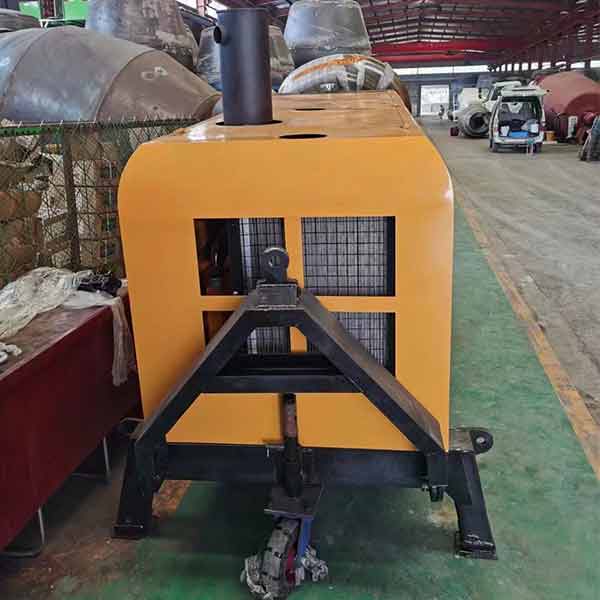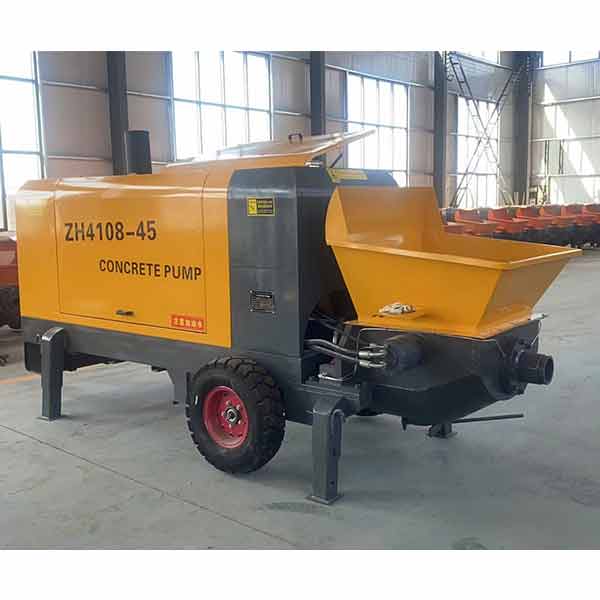Introduction
In the realm of construction, efficiency and effectiveness are paramount. The advent of small concrete pumps has revolutionized the way concrete is delivered and poured on job sites. In this comprehensive guide, we’ll explore the myriad advantages that small concrete pumps offer over traditional methods. From increased productivity to enhanced precision, discover why small concrete pumps are becoming indispensable tools in the construction industry.
Enhanced Maneuverability and Accessibility

Small concrete pumps represent a significant advancement in construction technology, particularly in their ability to navigate through challenging environments. Their compact design and innovative features enable them to excel in scenarios where traditional concrete delivery methods fall short. Let’s delve deeper into the intricacies of how small concrete pumps revolutionize access and maneuverability on construction sites.
Compact Design and Versatility: Small concrete pumps are engineered with a compact footprint, allowing them to maneuver through narrow passageways and tight spaces effortlessly. Unlike bulky concrete trucks that require ample clearance, these pumps can access confined areas without sacrificing performance or efficiency. Their versatility extends to various construction settings, including urban environments with limited space availability.
Precision in Tight Spaces: The agility of small concrete pumps makes them ideal for projects in densely populated areas or areas with restricted access. Whether navigating through narrow alleyways, maneuvering around existing structures, or negotiating obstacles on the job site, these pumps deliver precise concrete placement with unparalleled accuracy. This precision minimizes the risk of material waste and ensures optimal utilization of space, even in the most challenging environments.
Accessibility on Difficult Terrain: Small concrete pumps are not only adept at navigating tight spaces but also excel in traversing difficult terrain. From rugged construction sites to elevated platforms and inclines, these pumps can access areas that are inaccessible to traditional concrete delivery methods. Their robust design and advanced hydraulic systems enable them to maintain stability and performance on uneven or unstable ground, ensuring uninterrupted concrete placement in diverse environments.
Improved Efficiency and Productivity
Small concrete pumps stand out in the construction industry for their remarkable capability to enhance efficiency and productivity on job sites. Their unique features and functionalities contribute to streamlining concrete pouring processes, resulting in tangible benefits for construction crews and project timelines.
Faster Setup Times: Small concrete pumps are engineered for rapid deployment and setup, minimizing downtime and maximizing operational efficiency. Unlike traditional concrete delivery methods that may require extensive preparation and coordination, small pumps can be quickly mobilized to the desired location, ready for immediate use. This accelerated setup process enables construction crews to commence concrete pouring activities promptly, optimizing workflow and minimizing idle time.
Continuous Operation: Small concrete pumps are designed for continuous and uninterrupted operation, allowing for seamless concrete pouring throughout the duration of a project. Unlike manual methods or stationary concrete mixers that may necessitate frequent interruptions for reloading or recalibration, small pumps offer continuous supply and distribution of concrete. This sustained operation translates to consistent progress on the job site, eliminating bottlenecks and delays that can impede project timelines.
Quick and Accurate Concrete Placement: The precision and control afforded by small concrete pumps facilitate rapid and accurate concrete placement, ensuring uniform coverage and adherence to project specifications. Whether pouring foundations, slabs, or vertical structures, these pumps deliver concrete with pinpoint accuracy, minimizing the need for manual adjustments or corrections. This precision translates to higher-quality concrete finishes and reduced rework, optimizing productivity and resource utilization.
Precise Placement and Consistent Quality
Small concrete pumps represent a pinnacle of precision and reliability in the construction industry, offering unparalleled advantages in delivering concrete with exactitude and uniformity. Let’s explore the multifaceted aspects that contribute to their exceptional performance and consistency:
Controlled Pumping Mechanisms: At the heart of small concrete pumps lies sophisticated pumping mechanisms that enable precise control over the flow and distribution of concrete. These mechanisms allow operators to regulate the rate and pressure of concrete delivery with pinpoint accuracy, ensuring consistent placement and minimizing wastage. By exerting precise control over every aspect of the pumping process, small concrete pumps facilitate optimal utilization of materials and resources.
Accurate Placement: Small concrete pumps excel in placing concrete with precision, even in challenging or confined spaces. Their flexible hoses and maneuverable booms enable operators to navigate around obstacles and access hard-to-reach areas with ease. Whether pouring concrete for foundations, slabs, or vertical structures, small pumps deliver the right amount of concrete to the desired location with surgical precision, eliminating the need for manual adjustments or corrections.
Minimized Waste: By virtue of their controlled pumping mechanisms and precise placement capabilities, small concrete pumps minimize waste throughout the concrete pouring process. Unlike traditional methods that may result in overpouring or uneven distribution of concrete, small pumps ensure efficient utilization of materials, reducing the risk of costly material wastage and environmental impact. This optimal use of resources translates to cost savings for construction projects and contributes to sustainability goals.
Reduced Labor and Material Costs

Small concrete pumps not only revolutionize the concrete delivery process but also present compelling cost-saving opportunities for construction projects. Let’s delve deeper into how these innovative pumps streamline operations and drive down project costs:
Efficient Resource Utilization: Small concrete pumps optimize resource utilization by minimizing manual labor requirements. Unlike traditional concrete delivery methods that rely heavily on manual labor for mixing, pouring, and distributing concrete, small pumps automate much of the process. With automated pumping mechanisms and precision controls, these pumps reduce the need for labor-intensive tasks, freeing up manpower for other critical aspects of the project.
Labor Cost Reduction: By reducing the reliance on manual labor, small concrete pumps offer significant cost savings in labor expenses. With fewer workers needed to handle concrete pouring tasks, construction companies can realize substantial reductions in labor costs. Moreover, the labor force can be deployed more strategically, focusing on skilled tasks that require human expertise, thereby optimizing workforce efficiency and productivity.
Maximized Productivity: The efficiency gains achieved with small concrete pumps translate to maximized productivity on construction sites. With streamlined operations and reduced reliance on manual labor, construction crews can accomplish more in less time. This increased productivity not only accelerates project timelines but also minimizes overhead costs associated with extended project durations, leading to overall cost savings for construction companies.
Enhanced Safety and Environmental Benefits
Small concrete pumps prioritize safety and environmental sustainability. With their compact footprint and remote-controlled operation, these pumps minimize the risk of accidents and injuries on job sites. Furthermore, small concrete pumps reduce carbon emissions and environmental impact compared to traditional concrete delivery methods, making them an eco-friendly choice for construction projects.
| Aspect | Small Concrete Pumps | Traditional Concrete Delivery Methods |
|---|---|---|
| Safety | Prioritize safety with remote-controlled operation | May pose higher risk of accidents and injuries |
| Environmental Sustainability | Reduce carbon emissions and environmental impact | Potential for higher carbon emissions and pollution |
| Footprint | Compact footprint for minimal site disruption | Larger footprint, may require more space on site |
| Noise Levels | Typically quieter operation compared to larger equipment | May generate higher noise levels during operation |
| Fuel Consumption | Lower fuel consumption due to smaller engine size | Higher fuel consumption, especially for larger vehicles |
Conclusion
In conclusion, the advantages of small concrete pumps over traditional methods are undeniable. From increased maneuverability and efficiency to precise placement and environmental benefits, these innovative tools offer a host of advantages that can transform construction projects. By incorporating small concrete pumps into their workflows, construction companies can enhance productivity, reduce costs, and achieve superior results.
FAQ
Q: Are small concrete pumps suitable for residential construction projects?
A: Yes, small concrete pumps are highly versatile and can be used effectively in residential construction projects. Their compact size and maneuverability make them ideal for navigating tight spaces commonly found in residential areas. Additionally, small concrete pumps offer precise placement capabilities, ensuring accurate pouring for foundations, driveways, and other residential structures.
Q: How do small concrete pumps compare to traditional methods in terms of maintenance requirements?
A: Small concrete pumps typically have lower maintenance requirements compared to traditional methods such as concrete trucks. Their simplified design and fewer moving parts contribute to reduced maintenance needs, resulting in less downtime and lower maintenance costs for construction companies. Regular inspection and routine maintenance are still recommended to ensure optimal performance and longevity of small concrete pumps.
Q: Can small concrete pumps handle different types of concrete mixes and aggregates?
A: Yes, small concrete pumps are designed to handle a wide range of concrete mixes and aggregates, including standard concrete, lightweight concrete, and specialty mixes. They can accommodate various aggregate sizes and compositions, making them versatile for different construction applications. However, it’s essential to consult with the pump manufacturer or supplier to ensure compatibility with specific mixtures and aggregates.

